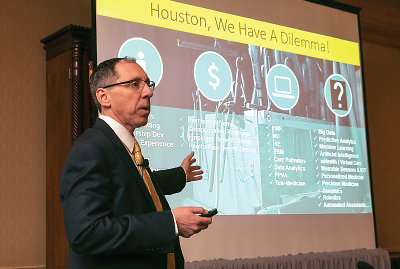Marketing, consumer services, and medicine.
Those terms may not automatically seem to go together, but Zeev Neuwirth, M.D., chair of population health at Carolinas Healthcare System, believes they should. In a presentation to the APA Board of Trustees last month, titled “What Medicine Can Learn From Marketing: A Consumerist Approach to Rebranding, Redesigning, and Reorganizing Healthcare,” Neuwirth said he believes American medicine needs to look outside itself for solutions to improving access and quality and lowering cost.
“The consumerist approach is a powerful conceptual framework,” he said. “The story is this—we have the best technology and highly resourced research and teaching institutions, yet we deliver suboptimal outcomes at an unsustainable cost.”
Neuwirth recited a litany of dismal statistics: between 500 and 1,000 preventable deaths a day occur in hospitals; the United States ranks 37th in quality outcomes, according to the World Health Organization; medical costs are the leading cause of bankruptcy in the United States; and as many as half of all U.S. physicians are demoralized or depressed.
“What industry has those kind of statistics?” Neuwirth said. “Change is an existential imperative.” Referencing a comment widely attributed to Albert Einstein—“you can’t solve a problem using the same mind that created the problem”—Neuwirth said American medicine needs to look outside itself, at entirely different models and systems.
Specifically, Neuwirth described examples of what he called “hyper-segmented modular care”—small groups of physicians who have organized to provide the highest quality care to patients with discrete conditions. These practices employ a consumer-driven approach to delivering services modelled on the marketing strategies of companies in the private sector—seeking to provide “concierge care” at the lowest cost possible.
He described several real-world examples of hyper-segmented modular care that he said point the way to the future:
•
Chen Med is a primary and specialty care practice focused on providing coordinated care to moderate- to low-income seniors with complex chronic diseases. ChenMed has centers in Atlanta; Chicago; Louisville, Ky.; New Orleans; Richmond, Va.; and Tidwater, Va. “By recruiting focused physicians and reducing their doctor-to-patient ratios, we increase patients’ ‘face time’ during each monthly appointment, which helps foster stronger doctor-patient relationships and enhances compliance with treatment plans,” according to the ChenMed website. “As a result of our efforts, our patients realize lower hospital admissions.” (
website)
•
Omada Health is a “digital health behavior counseling program” focused on helping patients with chronic disease make lifestyle changes. Omada Health contracts with employers and health plans to deliver lifestyle coaching and behavior counseling to individuals electronically, aimed at promoting healthy lifestyles and reducing medical utilization. (
website)
•
Virta Care is an online specialty clinic focused on reversing type 2 diabetes that employs smartphone technology. “Virta addresses the underlying causes of type 2 diabetes using a highly individualized approach to carbohydrate intake and nutritional ketosis, accounting for each patient’s unique biochemistry, medications, and lifestyle,” according to the Virta website. (
website)
Neuwirth added that he believes psychiatry and behavioral health are keys to health system reform that can capitalize on these models of hyper-segmented, modular care.
He appeared before the Board as part of APA President Anita Everett, M.D.’s priority focus on innovation. After the meeting, Everett told Psychiatric News that Neuwirth’s approach to innovation draws on “analogous learning”—the capacity to translate lessons from an entirely different field into usable solutions for American medicine.
“Dr. Neuwirth brings a fresh perspective to how to introduce innovation into our health care system to improve access and quality,” said Everett. “It is a goal of my presidential initiative on innovation to inspire APA and its members to use the same kind of analogous learning to think creatively about how we can deliver our high-quality psychiatric services to more people. The examples Dr. Neuwirth provided the Board of small practices focused on delivering the very highest quality care to patients with specific, discrete conditions could be a model for transforming the way health and mental health care is delivered.” ■

